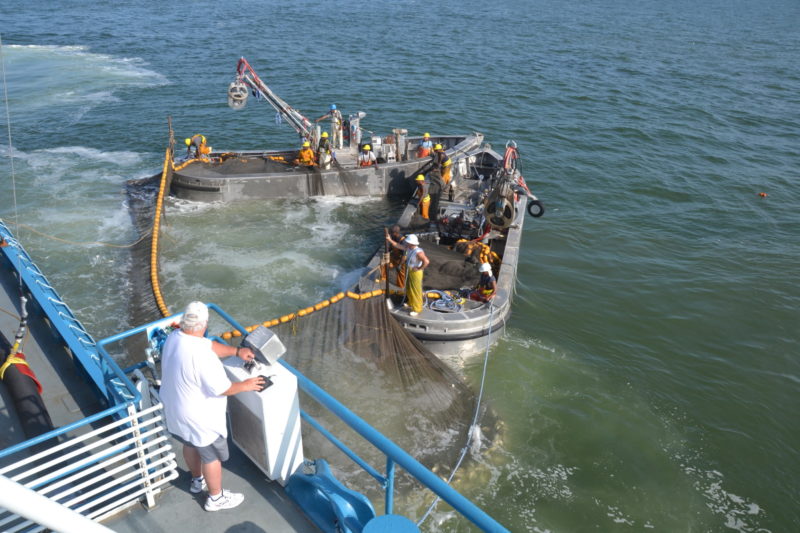SAI Global, one of the leading certification bodies for the Marine Stewardship Council, announced on December 4 that it's recommending the Atlantic menhaden fishery be certified as sustainable.
The recommendation is a key step in the fishery attaining MSC certification. Now, the certification will go to a 30-day public comment period.
Omega Protein, by far the largest fisher of menhaden, has been the company leading the drive for MSC certification.
The recommendation comes amid some rising controversy over the fishery as competing groups — such as recreational fishermen and whale-watchers — claim that the fishery has been negatively impacting the environment. One nonprofit, Gotham Whale, has developed a petition directly targeting Omega Protein called the “Gotham Whale Action Plan.”
The petition calls for the Omega Protein fleet to be forced to fish 20 miles from New York or New Jersey. Currently, the vessels legally fish outside the three-mile limit.
Gotham Whale’s issue with the fishery largely relates to menhaden’s role as food for humpback whales in the region surrounding New York Harbor near New York City.
“Gotham Whale has been documenting humpback feeding in this area since 2011 and we would like it to continue,” the organization’s petition states. “We are also appealing to the owners of Omega Protein to further persuade them to leave the bunker for the whales.”
The conflict has already gained some attention from media. A New York Times article interviewed several recreational fishing and sightseeing boat captains, many of which claimed that the large Omega Protein boats were causing problems.
“We have a major issue with a fishing fleet coming in and taking all the food from the whales,” Tom Paladino, a whale watching boat captain, told the Times.
Omega Protein has also butted heads with the Atlantic States Marine Fisheries Commission after the management organization put Virginia on notice for not implementing a reduced menhaden catch limit for Chesapeake Bay. While the overall limit for menhaden was raised for the 2018 and 2019 seasons to 216,000 metric tons (MT), the Chesapeake Bay limit – where Omega Protein does a lot of its fishing – was set for just 51,000 MT.
Chesapeake Bay’s quota was previously 87,216 MT. While the state of Virginia’s total quota was 170,000 MT, that represented little to no increase, something that didn’t add up for Omega Protein.
“We feel that it’s targeting one company, which is what this provision applies to Omega,” Ben Landry, Omega Protein’s director of public affairs, told SeafoodSource in May, noting that there are no caps for the bait fishery. “It’s not in accordance with the best available science. It’s not necessary for the conservation of the species because it’s not overfished.”
Omega Protein has responded to much of the criticism, particularly from op-eds and the story in The New York Times. The company cites the menhaden fishery’s limited bycatch, and the stock assessments that have found that menhaden is not overfished, and overfishing is not occurring.
“These positive findings led the ASMFC to raise the coastwide menhaden quota in each of the last three years, most recently last November,” Omega Protein wrote in a press release in September soon after the article in the New York Times debuted.
News of the recommendation by SAI Global was a boon for Omega Protein, which cites the comprehensive nature of the assessment as proof that its efforts to keep the fishery sustainable are working.
The assessment, which began its process in May 2017, found that the Atlantic menhaden fishery has a comprehensive fisheries management project in place, that menhaden biomass is “well above single species threshold levels,” and that there’s a system for monitoring and evaluating the fishery management system. The report also found that the menhaden purse seine fishery scored well against MSC’s performance indicators.
However, there are some conditions on the recommendation. Chief among those is that Omega Protein “must provide evidence of the implementation of a harvest strategy that is designed to take into consideration the ecological role of Atlantic menhaden and is responsive to the state of the stock with respect to its role in the U.S. Northwest Atlantic ecosystem.”
SAI Global’s report on the menhaden fishery also criticized the ASMFC, saying that the assessment was “constrained” due to the absence of publicly available information on the mission, objectives, and consultation and engagement process of the council.
Regardless of the criticisms and recommendations for the future, SAI Global still found that the Atlantic menhaden fishery is eligible for MSC certification.
“Omega Protein and the Atlantic menhaden fishery have operated according to the highest standards of sustainability for a long time,” Omega Protein Vice President of Operations Monty Deihl said. “Today’s report is an encouraging sign that our hard work is paying off. We look forward to working with MSC going forward to ensure that we continue to meet their high standards.”







